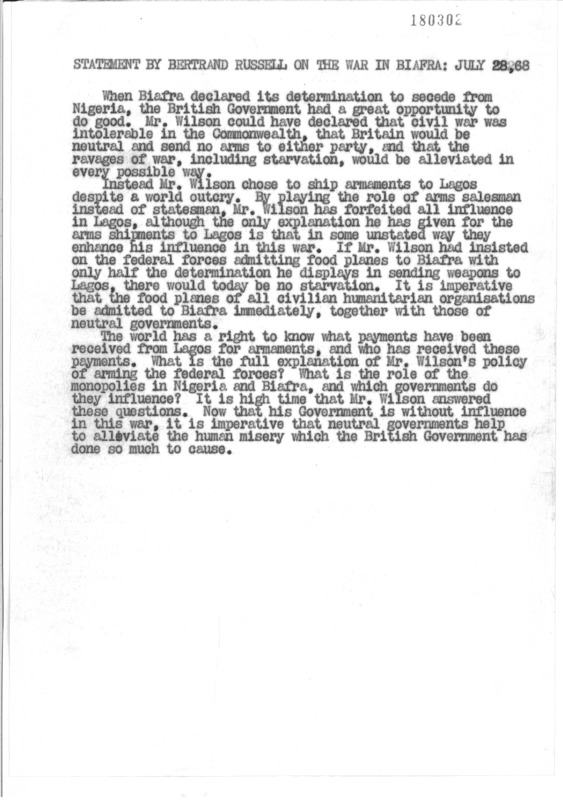Statement by Bertrand Russell on the War in Biafra
Item
Title
Statement by Bertrand Russell on the War in Biafra
Contributor
Long, C.
Creator
Bertrand Russell
Date
July 28, 1968
Format
jpg
Identifier
Bertrand Russell Archives, Box 9.49, Doc. 180302
Language
eng
Rights
McMaster University
Source
Bertrand Russell Archives
Type
Text
Text
STATEMENT BY BERTRAND RUSSELL ON THE WAR IN BIAFRA; July 28, 68
When Biafra declared its determination to secede from Nigeria, the British Government had a great opportunity to do good. Mr. Wilson could have declared that civil war was intolerable in the Commonwealth, that Britain would be neutral and send no arms to either party, and that the ravages of war, including starvation, would be alleviated in every possible way.
Instead Mr. Wilson chose to ship armaments to Lagos despite a world outcry. By playing the role of arms salesman instead of statesman, Mr. Wilson has forfeited all influence in Lagos, although the only explanation he has given for the arms shipments to Lagos is that in some unstated way they enhance his influence in this war. If Mr. Wilson had insisted on the federal forces admitted food planes to Biafra with only half the determination he displays in sending weapons to Lagos, there would today be no starvation. It is imperative that the food planes of all civilian humanitarian organisations be admitted to Biafra immediately, together with those of neutral governments.
The world has a right to know what payments have been received from Lagos for armaments, and who has received these payments. What is the full explanation of Mr. Wilson's policy of arming the federal forces? What is the role of the monopolies in Nigeria and Biafra, and which governments do they influence? It is high time that Mr. Wilson answered these questions. Now that his Government is without influence in this war, it is imperative that neutral governments help to alleviate the human misery which the British Government has done so much to cause.
When Biafra declared its determination to secede from Nigeria, the British Government had a great opportunity to do good. Mr. Wilson could have declared that civil war was intolerable in the Commonwealth, that Britain would be neutral and send no arms to either party, and that the ravages of war, including starvation, would be alleviated in every possible way.
Instead Mr. Wilson chose to ship armaments to Lagos despite a world outcry. By playing the role of arms salesman instead of statesman, Mr. Wilson has forfeited all influence in Lagos, although the only explanation he has given for the arms shipments to Lagos is that in some unstated way they enhance his influence in this war. If Mr. Wilson had insisted on the federal forces admitted food planes to Biafra with only half the determination he displays in sending weapons to Lagos, there would today be no starvation. It is imperative that the food planes of all civilian humanitarian organisations be admitted to Biafra immediately, together with those of neutral governments.
The world has a right to know what payments have been received from Lagos for armaments, and who has received these payments. What is the full explanation of Mr. Wilson's policy of arming the federal forces? What is the role of the monopolies in Nigeria and Biafra, and which governments do they influence? It is high time that Mr. Wilson answered these questions. Now that his Government is without influence in this war, it is imperative that neutral governments help to alleviate the human misery which the British Government has done so much to cause.

